Problems of the Ukrainian Bar were discussed at a conference in Vienna
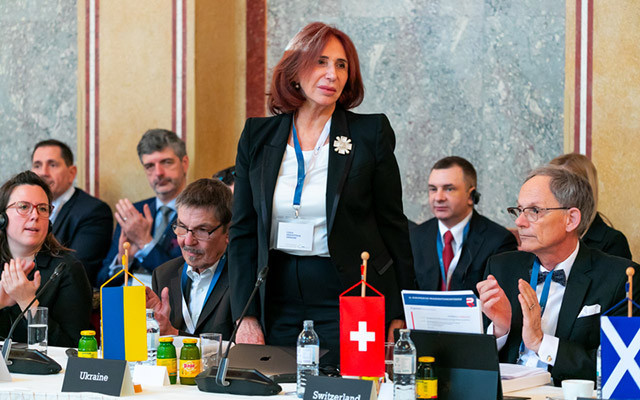
The 52nd European Conference of Presidents of Legal Organizations, traditionally organized by the Austrian Bar Association (ÖRAK), has recently taken place at Vienna's Ferstel Palace.
More than two hundred representatives of European and international organizations of lawyers, judges, politicians and academics from forty countries gathered in the legal center of Europe to discuss topical issues of the rule of law and problems of realization of fundamental human rights and freedoms.
The Ukrainian delegation was represented by Lidiya Izovitova, president of the Ukrainian National Bar Association and the Bar Council of Ukraine, Valentyn Gvozdiy, vice president of UNBA, BCU and Serhiy Barbashyn, chairman of the UNBA Next Gen.
In her report, president of the UNBA focused on the problems of the Ukrainian bar under martial law. The professional organization, which unites all Ukrainian lawyers, has recently received reports of shameful pressure exerted on defense lawyers. Thus, if the prosecution does not like the overly active position of a lawyer in a criminal case, and there are no procedural (legal) tools to defend the legal position, representatives of the military authorities (TCC) suddenly appear in the courtroom and hand the lawyer a mobilization notice.
Judges, prosecutors, their assistants, law enforcement officers, and all other employees of the justice system are protected from mobilization. However, lawyers have no guarantees in this regard. Even though the Constitution of Ukraine entrusts them with the function of providing legal aid, and the institution is recognized as a component of justice.
L.Izovitova emphasized the risks in protecting the rights of citizens and the absence of a provision on booking lawyers in the government draft law No. 10449 on strengthening mobilization, introduced on January 30 this year. The draft law was adopted by the Verkhovna Rada in the first reading extremely quickly without taking into account the position of the bar, which was sent by the UNBA to the Parliament. The very next day, the Bar Council of Ukraine convened an extraordinary meeting and decided to submit the relevant amendments to the legislative initiative.
President of the UNBA emphasized that in this case it is not only about observance of the principle of fair justice, equality of participants in legal proceedings and guarantees of legal profession, but first of all about ensuring the right to legal aid for vulnerable groups of the population and other citizens of Ukraine, including military personnel. L. Izovitova expressed her hope for support in this matter.
Other speakers at the conference included First Deputy President of the European Parliament Othmar Karas, President of the Council of Bars and Law Societies of Europe (CCBE) Pierre-Dominique Schupp, Rector of Johannes Kepler University of Linz Lucas Meinhardt, Director of the Center for Artificial Intelligence and Digital Policy (USA), Professor Mark Rothenberg, and other distinguished guests.
V.Gvozdiy held a number of working meetings with the heads of European bars to further establish cooperation and provide assistance to Ukrainian lawyers who suffered losses as a result of military operations in our country.
After the conference, the Austrian Federal Minister for EU and Constitutional Affairs Caroline Edtstadler invited the conference participants to the Federal Chancellery. Federal Minister of Justice Alma Zadic hosted a reception at the Trautson Palace.
Popular news
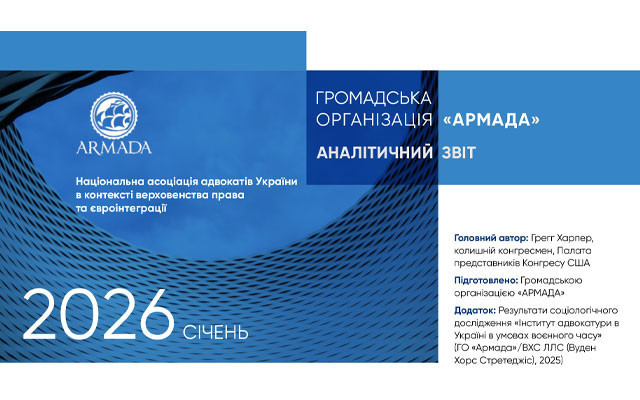
European integration
A translation of the report on advocacy presented to the European Parliament has been published
A translation of a research report on the Ukrainian advocacy profession in wartime, previously presented to the European Parliament in Brussels, has been published. The document is presented as a basis for discussion on the rule of law, Ukraine's European integration aspirations, and countering Russian disinformation in the legal sphere.
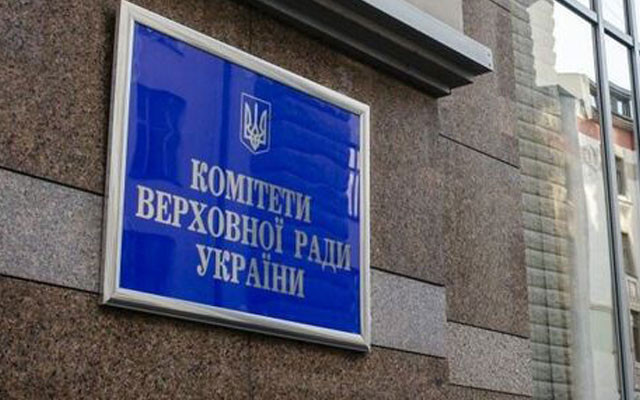
Legislation
The Verkhovna Rada Committee criticized the format of the government working group on advocacy
The implementation of the Roadmap on the rule of law (approved by Cabinet of Ministers Resolution No. 475-r of May 14, 2025) in relation to advocacy raises the practical question of who exactly should prepare legislative changes and how.
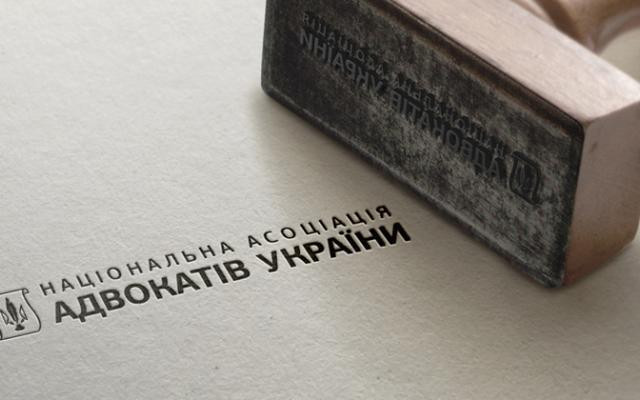
Self-government
The BCU demands a review of the composition of the government working group on reforming the advocacy profession
The President of the UNBA, BCU Lidiya Izovitova, appealed to the Cabinet of Ministers of Ukraine to review the composition of the working group on improving legislation in the field of advocacy and legal practice.
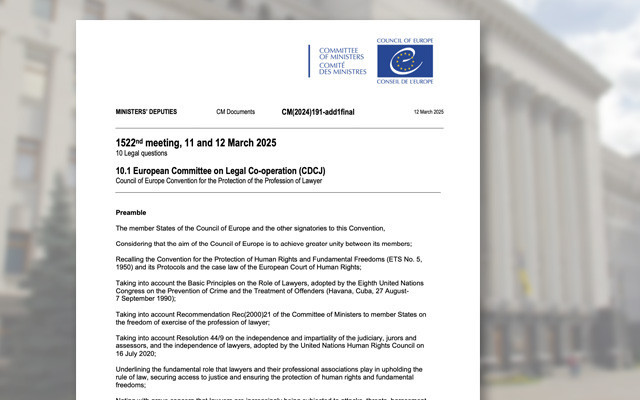
Guarantees of the practice of law
The President has determined, who will sign the Convention for the Protection of the Profession of Lawyer
President of Ukraine Volodymyr Zelenskyy authorized Ukraine's Permanent Representative to the Council of Europe Mykola Tochytskyi to sign the Council of Europe Convention for the Protection of the Profession of Lawyer.

Discussion
Why lowering the age of marriage lacks legal logic
Although until 2012 there was a provision in family law that allowed children to marry from the age of 14 under certain circumstances, its return to Ukrainian law would contradict international obligations and the logic of criminal law.
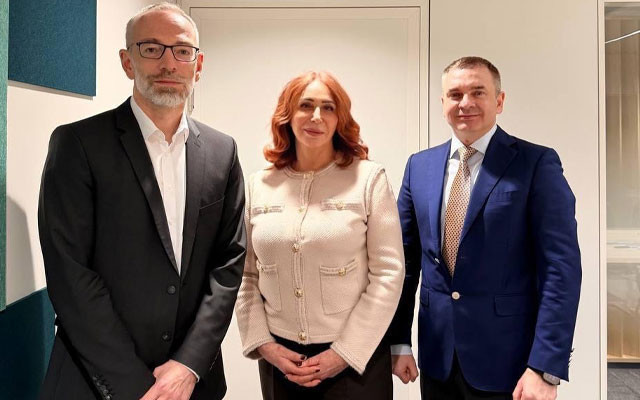
European integration
Open dialogue between the UNBA and the European Commission on the path to EU
The Ukrainian National Bar Association held a working meeting in Brussels with Mr Wolfgang Nozar, Head of Unit for Governance, Rule of Law and Financial Assistance, Directorate-General for Enlargement and Eastern Neighbourhood (DG ENEST), European Commission.

Self-government
A report on Ukrainian advocacy was presented in the European Parliament
Can a shadow report on advocacy replace the political framework of the Roadmap on the rule of law with demands for the restructuring of self-government? Where is the line between accountability and the seizure of institutions? And how can we respond to narratives with data rather than impressions?
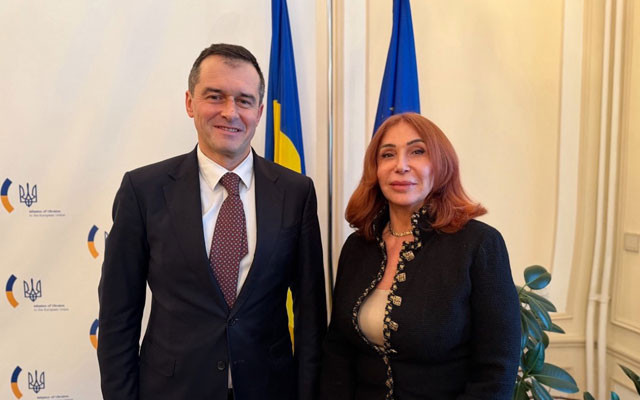
European integration
UNBA and Ukraine's representation to the EU have synchronized their priorities
On February 5, in Brussels, the President of the UNBA, BCU Lidiya Izovitova held a working meeting with the Ambassador Extraordinary and Plenipotentiary of Ukraine, Representative of Ukraine to the European Union Vsevolod Chentsov.
Publications

Volodymyr Matsko Extradition as a systemic form of rights violations

Victoria Yakusha, Law and Business The anti-corruption vertical cannot «take care» of the Bar as an institution, - acting head of the HQDCB

Censor.net Protecting advocates – protecting justice: addressing concerns about the new law

Ihor Kolesnykov A BRIEF SUMMARY REGARDING THE APPLICATION OF THE ORDER ON EXTENDED CONFISCATION IN LATVIA REGARDING FINANCIAL ASSETS OF…

Valentyn Gvozdiy WORKING IN A WAR ZONE

Lydia Izovitova Formula of perfection

Sergiy Vylkov Our judicial system is so built that courts do not trust advocates

Iryna Vasylyk Advocacy in the proclamation of Independence of Ukraine
